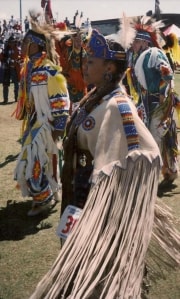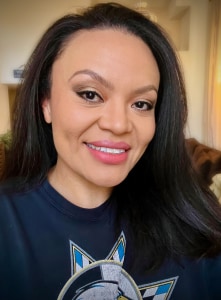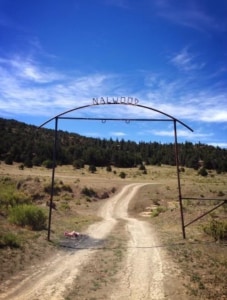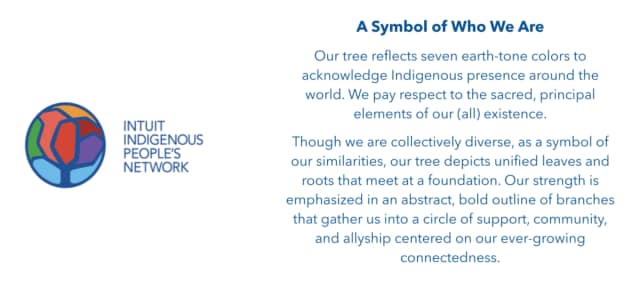Indigenous Peoples Day is celebrated in the United States on the second Monday in October, and is an opportunity to amplify Indigenous voices and increase allyship.
Dessa Nalwood-Arrow is a Senior Business Analyst and Global Chair for Intuit Indigenous Peoples Network, one of our 14 employee resource groups. Having celebrated their one-year anniversary in August, this ERG works to cultivate awareness and support opportunities for Indigenous people around the world through community and allyship.
We sat down with Dessa to learn more about her journey to Intuit and advice for anyone to be a better ally to Indigenous people.
Tell us a little bit about yourself.
Yá’át’ééh shik’éí dóó shidine’é. Shí éí Dessa Nalwood-Arrow yinishyé. Quapaw nishłį́, Tódich’ii’nii bashishchiin, Quapaw/Osage dashicheii, Áshįįhi dashinalí. Ákót’éego diné asdzáán nishłį́. Tucson kééhasht’į́ ndi Chʼínílį́ déé’ naashá. Ahéhee’.
Hello, my relatives and my people. My name is Dessa Nalwood-Arrow. I am Quapaw, born for the Bitter Water People, my maternal grandfather is Quapaw/Osage, and my paternal grandfather is of the Salt People. In this way I am Diné – a Navajo – woman. I currently reside in Tucson, Arizona, but I am from Chinle, Arizona (which is more widely known as Canyon De Chelly – pronounced “shay” not “shelly”). I am grateful, thank you.
For the Navajo, introductions are less about telling someone about yourself, and more about sharing where you come from and what defines you. It is customary for Diné (Navajo) to introduce ourselves to one another in this way.
What brought you to Intuit?

The opportunity for me to join Intuit was entirely unexpected. I was happy at my current job and had personally and professionally grown with my organization at the time.
When I was approached by a recruiter, I was curious but entirely suspicious. I researched everything I could about Intuit. I was blown away by Intuit’s values and the commitment the company makes to communities and people around the world. Having worked in a smaller, community-oriented organization, I was connected to the importance of making a difference for those in my scope of influence, but I’d never considered that at scale.
In reality, what brought me to Intuit was the people. With every person involved in my hiring process, I truly saw the personification of words on a page and the true scope of their impacts. I was inspired, motivated, and admittedly terrified, but willing to answer the call to do the same and be the same for others.
What inspired you to take on a leadership role with the Intuit Indigenous Peoples Network (IIPN)?
Intuit and IIPN have offered a place within my professional life where my ‘Why’ resonates and where identities aren’t only valued but met with similar frames of reference alongside open minds looking to learn and support. I have professionally come to appreciate that who we are is as important as what we do.
The newness of IIPN, having only officially been introduced and established as of August 2021, drew me to the opportunity to share in the responsibility of establishing an operational framework, continuing the development of an impactful foundation, and building upon the path paved by the founders of our ERG. Taking on this leadership role is one way I hope to contribute to the momentum of Indigenous representation, awareness, and advocacy to expand the spaces where we can all thrive.

What makes the IIPN special to you?
Growing up on the Navajo Nation, I spent summers remotely with my nalis (paternal grandparents). It was through hauling water, chopping wood, and herding livestock, I came to understand and appreciate that there are many dimensions to what most will only ever see as a modern, ever-changing world. I have always been driven professionally by the lessons learned from those summers: that we are defined by our effort, that (hard) work is the only true commodity, and that who we are is sacred.
It wasn’t until I was given the opportunity to join Intuit, to be part of this community that I found comfort in being me and openly sharing who I am and what I hold sacred with others, regardless of their awareness or understanding.
What makes IIPN special to me is that for the first time in my professional life I can actually say that I have a space to truly bring my whole self to work and the opportunity to elevate and advocate because of, on behalf of, and for Indigenous People.
Walk us through a typical day for you as an employee and as a leader of the IIPN.
I am a Senior Business Analyst working with the Customer Account Protection team. I was appointed as Global Chair for IIPN in January 2022 after previously participating as a Steering Committee Member. The last nine months have felt like a blur of growing out of my newness, helping IIPN through its newness, building structure and operational rigor for the Steering Committee, learning from and with my previous co-chairs, and establishing the groundwork for the next financial year.
Much of my work in my “day job” and my contributions to IIPN are inter-connected. I apply what has worked well for my operational team to IIPN and vice versa. Every effort I’ve made these last few months has been connected to leveraging the experience I’ve gained throughout my professional journey and being intentional about not wasting an opportunity to improve, enhance, advance and innovate in both realms.

What is a piece of advice you’d give to someone who wants to be an ally of the IIPN?
I believe one of the biggest challenges every marginalized group or community faces is the unstated and implicit bias. The best way to be an ally, in general, is to accept, understand, and acknowledge that any one person, group, or community is not reflective and representative of the whole.
Everything that makes someone Indigenous or defines one’s personal Indigenous identity or connection is unique to them, their experiences, their journey.
From a generic internet search, the statistical snapshot is as varied as we are individually. Even the term Indigenous Peoples can mean a number of things for different people: First Nations, Native American, a person Indigenous to, Aboriginal, and more.
- According to Amnesty.org, there are 370 million Indigenous people around the world and spread across more than 90 countries.
- According to Unesco.org, there are at least 350-700 million, Indigenous peoples representing the greater part of the world’s cultural diversity, with a global land footprint of approximately 22%, and who speak the major share of the world’s almost 7000 languages.
- And according to UN.org, it is estimated there are more than 370 million Indigenous people spread across 70 countries worldwide.
As an ally to IIPN, you are an ally to all Indigenous Peoples, respectful of our terms, openness, limits, culture, perspective, identity, and journey. An ally must be mindful of that responsibility.
Ultimately, our expectation is not that you are an expert or representative of your community but that you are open and willing to share a mutually beneficial space with us. We welcome everyone because we are all connected and we know we are all an ally to one another.
—
At Intuit, we’re passionate about making sure that everyone can show up as their authentic self at work. Through ERGs like the Indigenous Peoples Network, we are able to foster a sense of connection, empathy, and trust between employees. This is the foundation for a culture of diversity and inclusion.